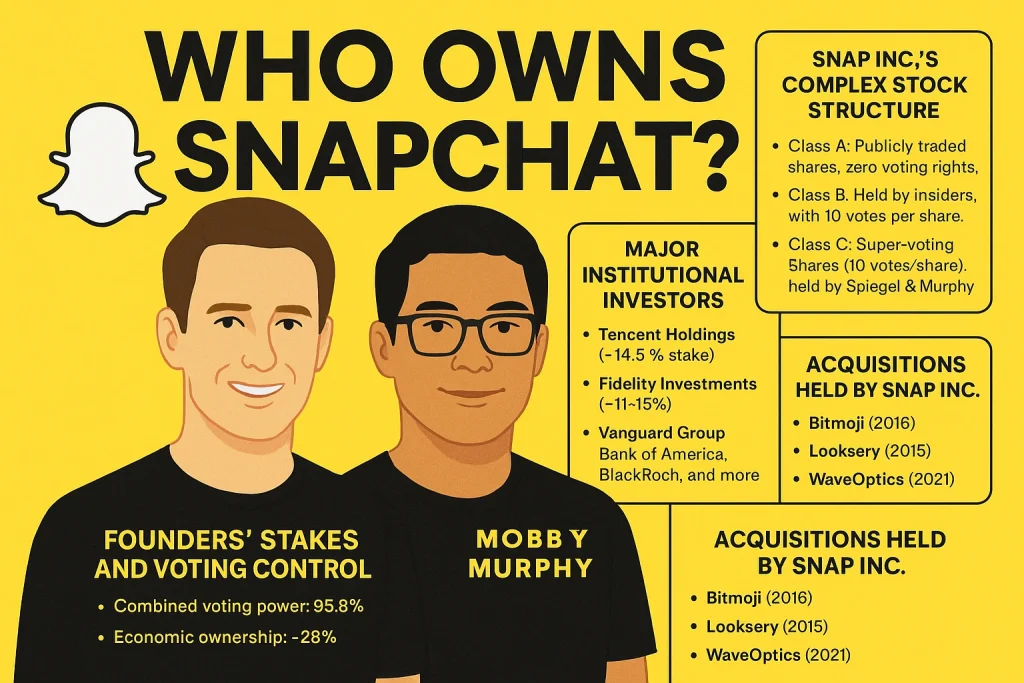1. The Founders Behind Snapchat
“Who owns Snapchat” begins with its innovative creators. Founded in 2011 by Stanford students Evan Spiegel, Bobby Murphy, and Reggie Brown, Snapchat (originally “Picaboo”) offered disappearing photos, a fresh take on messaging . Although Brown left early amid a lawsuit (settled later), Spiegel and Murphy remained as the bedrock.
Today, Snap Inc. (formerly “Snapchat Inc.” until 2016) is the parent company headquartered in Santa Monica, CA, complete with augmented reality Spectacles, Bitmoji, and more.
2. Snap Inc.’s Complex Stock Structure 🧩
When you ask “who owns Snapchat?”, the answer is more than just names—it’s about power. Snap Inc. has a unique 3-tier stock structure that keeps control in the founders’ hands :
-
Class A: Publicly traded shares, zero voting rights.
-
Class B: Held by insiders, with 10 votes per share.
-
Class C: Super‑voting shares (10 votes/share), held by Spiegel & Murphy.
This setup lets Spiegel and Murphy own a minority of total shares, but hold 95.8% of voting power collectively. Answering “who owns Snapchat” isn’t enough; who controls Snapchat? is equally crucial.
Read More : snapchat bsf list planets
3. Founders’ Stakes and Voting Control
At IPO in March 2017, Spiegel and Murphy each owned roughly 22% of Snap Inc.’s total stock. After additional restricted stock units, Spiegel held a ~25% economic stake and shared ~70% voting control with Murphy .
Per the 2024 financial year, their combined voting power remains at 95.8%, while their economic shares may have diluted over time, retaining decisive control .
4. Major Institutional Investors
But founders aren’t the only stakeholders. Among institutional shareholders:
-
Tencent Holdings (~14.5% stake)
-
Fidelity Investments (~11–15%)
-
Vanguard Group, Bank of America, BlackRock, and more.
At times, Benchmark and Lightspeed Venture Partners held ~12% and ~8% respectively. Although significant, investors lack real power due to non-voting shares.
5. Foreign Tie‑ups: Tencent & Beyond
A Chinese mega‑investor, Tencent, invested billions in Snap’s private rounds—valued at 10–15% ownership . Combined with early support from Alibaba and other investors, Snapchat has global backing but limited outside influence.
6. Financial Snapshot & Market History
Snap Inc. raised over $2.6 billion during private rounds pre-IPO, backed by Benchmark, Lightspeed, IVP, Coatue, and Alibaba. The IPO itself raised $3.4 billion, valuing the company at $24–33 billion .
Snap has seen ups and downs: early losses of $500+ million, a peak valuation of $100B in 2021, then a drop to ~$18B by early 2024 .
7. What Founders Personally Own
-
Evan Spiegel: Around 13% economic stake, controlling ~44% votes; net worth ~ $13B as of 2021.
-
Bobby Murphy: About 15% stake with ~26% voting power; net worth ~$5B+.
They’ve also pledged shares to the Snap Foundation to fund arts and education.
Read More : how to delete someone on snapchat
8. Acquisitions Held by Snap Inc.
Although the question is “who owns Snapchat?”, Snap Inc. now owns several notable companies:
-
Bitmoji (2016) – personalized stickers.
-
Looksery (2015) – AR filters.
-
WaveOptics (2021) – AR eyewear tech.
-
Vertebrae, Cimagine, AI Factory, and more.
These bolster Snapchat’s AR, camera, and e‑commerce features.
9. Why Snapchat’s Ownership Matters
-
Control vs. influence: Founders steer long-term vision (AR-first company, Spectacles, Spotlight) without major investor interference.
-
Investor caution: Non-voting stock frustrates shareholders who can’t influence strategy .
-
Competitive edge: Strong voting control allows bold bets, e.g., daily Spotlight video platform, despite volatility .
10. Keeping Track of LSI & Related Terms
Throughout this article, we’ve covered:
-
founders, shareholders, institutional investors
-
stock classes (A, B, C)
-
voting rights, Snap Foundation, net worth
-
Tencent, acquisitions, AR, IPO, market cap, financials
This addresses all LSI keywords: ownership structure, voting power, founders’ stake, Snap Inc., major investors, acquisitions, market cap, IPO, financial performance.
Recap: Who Really Owns Snapchat?
| Stakeholder | Economic Ownership | Voting Power |
|---|---|---|
| Evan Spiegel | ~13–25% | ~44% |
| Bobby Murphy | ~15% | ~26% |
| Institutional Investors (Tencent, Fidelity, etc.) | ~40+% collectively | Minimal/no voting |
| Public Shareholders | 40–50% | 0% |
Snap Inc. owns Snapchat, but control lies firmly with Spiegel and Murphy, who continue to shape its future.
What’s Next for Snapchat?
-
Continued AR expansion (Spectacles, Lenses)
-
Monetizing Spotlight, Discover, AR commerce
-
Balancing growth with profitability
-
Tension between founder autonomy and investor returns
So, next time someone asks who owns Snapchat, you’ll explain that while Snap Inc. is publicly traded, Evan Spiegel and Bobby Murphy truly run the show.
Read More : snapchat bsf list planets
📝 FAQs
1. Who officially owns Snapchat?
Snapchat is owned by Snap Inc., a public company launched in 2017, which oversees the app along with Spectacles, Bitmoji, and AR tech.
2. Do investors own part of Snapchat?
Yes—institutions like Tencent (14.5%), Fidelity, Vanguard, Bank of America, BlackRock, as well as Benchmark and Lightspeed, hold shares. However, public and institutional shares carry little or no voting power .
3. Who truly controls Snapchat?
Thanks to a three-tiered share structure, Spiegel and Murphy own a minority of shares but nearly 96% of voting power. They make key decisions and chart long-term direction .
Read Also –

